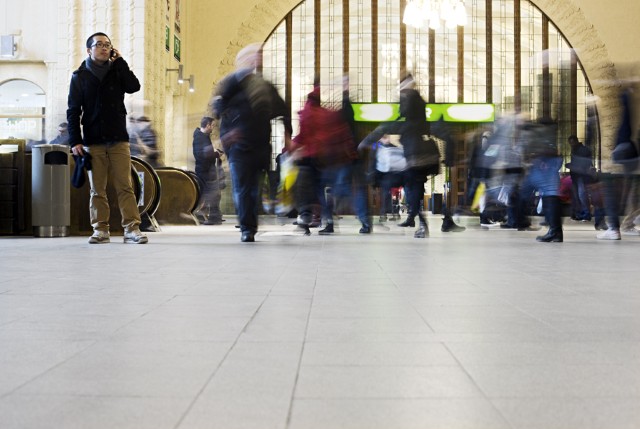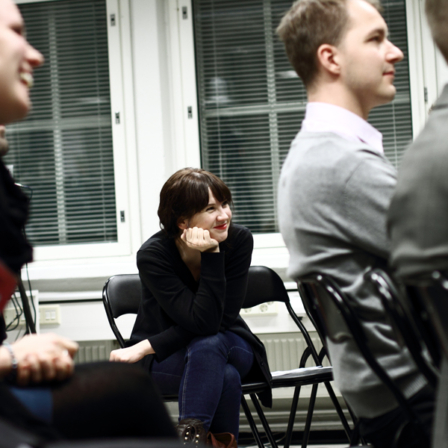One of our tasks at Sitra is to create moments when people can look into the future together, to boldly demolish existing structures, to play with the wildest ideas and to try something new in practice. In line with this, Sitra’s societal training activities between 2011 and 2015 included five Synergise Finland forums. The idea of the Synergise Finland forums was to bring together groups of opinion formers from all walks of life, ranging from grass-roots actors to political decision-makers. While learning from one another, they explored the structural and cultural changes required in Finland in connection with the forum theme. These forums involved practical experiments and activities aimed at solving the social problems identified.
The themes of the Synergise Finland forums were work (2011), democracy (2011–12), a sustainable economy (2012–2013), security (2013–2014) and, at the last forum, education (2014–2015).
Now after five years it is a good time to look back – particularly as I, as leader of the Synergise Finland forums and having been allowed to accompany the forums from the first one to the present, am now about to start my maternity leave – and to reflect on what we have learnt in five years.
The history of Sitra’s forums is a good example of how changes in social phenomena are sometimes surprisingly fast and sometimes painstakingly slow. Year after year, decision-makers and other actors are faced with the same challenges. Our society remains too detached and hierarchical, and unable to look far enough into the future. Taking action and making decisions seem cumbersome.
However, there is consensus on a surprising number of solutions, regardless of themes.
- There should be a shift in the role of the public sector, making it an enabler and provider of user-friendly services
- We need a more cross-societal approach and more transparency in decision-making
- We should embrace a culture of experimentation
- We should better consider various individuals’ resources
Making these changes is easier said than done. This was the conclusion of all five forums. Structures, attitudes and norms change slowly. Whereas changes in technology, language and concepts, and practical movements can occur surprisingly quickly.
Strength lies in networks and dialogue
Time and again, the Synergise Finland forums have come to the conclusion that, in order for society to change, grass-roots movements from the bottom up and political steering and decision-making from the top down are equally important. Networks and practical operators hold vast amounts of experience-based information, and giving marginal ideas centre stage may lead to a new kind of understanding.
Structures in Finnish society need to be challenged and questioned, because we tend to stick to whatever has worked in the past. The themes of our past forums are good examples of this: our education system, our security policy, the structures of our labour market.
Another insight gained in the forums relates to crossing traditional lines and divisions. The most interesting insights are a result of the dialogue between theory and practice, and between experience-based and rational information. Together, we have been removing the barriers separating the soft and hard sciences, thinking and doing, and the internal and external activities of organisations. The forums have brought together people who would normally never work together. What connects a young author and an experienced corporate manager? What about an NGO activist and a public servant? A municipal manager and a start-up entrepreneur? They all share a passion for social development. This is also the core strength of our society. In order to showcase different views, break down hierarchies and shake up structures, we need to multiply our ways of participation. Collective decision-making is challenging. It is even more challenging when people from all walks of life are involved.
How to implement systemic change?
We need to learn more about implementing systemic change and we need to understand how socially significant changes occur, how to create new understanding in networks, how to question existing structures, and how to create something new together. And what happens when we reach a consensus that leads to long-term impact – what kind of methods will lead to effective solutions?
One of the biggest challenges in social decision-making is a short time span. The forums have encouraged decision-makers and actors to look into the distant future. When our goals are set far enough ahead, it is easier to let go of our personal advantages and interests. This is what makes creating visions worthwhile. Although many share the same vision about developing Finnish society, whether the focus is on education, the economy, democracy or security, changes are hard to achieve. This is due to unyielding structures, and people holding on to existing advantages.
Creative problem-solving requires an open mind and experiments in place of talks. The best ideas are achieved by doing and learning, not by thinking. This is why the forums have included a number of experiments in collaboration with an extensive network of actors.


Recommended